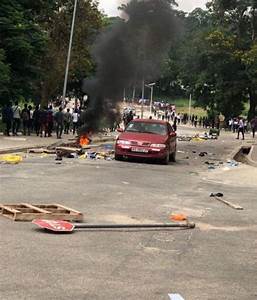What the law says: On Students vandalism
The Executive Director of the Education Thinktank, Africa EduWatch, Kofi Asare, subsequently called on the Ghana Education Service, Ghana Police Service and the Attorney General to begin criminal prosecution of such students

Early this month, part of the boys’ Dormitory of the Nyinahini Catholic Senior High School in the Ashanti Region was razed down by fire.
The fire, that burnt down six rooms, was suspected to have been ignited by some final year students of the school after their last WASSCE paper.

Items destroyed included school uniforms, food boxes and other learning materials.
This led to a stern reaction from the chief of the area and The District Chief Executive on the situation.
A statement by the Spokesperson of the District Chief Executive disclosed an arrest of a student by police in connection with the fire.
The Executive Director of the Education Thinktank, Africa EduWatch, Kofi Asare, subsequently called on the Ghana Education Service, Ghana Police Service and the Attorney General to begin criminal prosecution of such students.

“GES, Ghana Police Service and Attorney General must begin criminal prosecution of students who vandalize school property. This must run alongside the existing surcharging regime which does not sufficiently deter; after all, the students are not the ones who pay the surcharge. When rampaging students begin to engage prison walls, their colleague juniors would think thrice before embarking on a future Nyinahini expedition. Nyinahii must redefine the GES sanctions regime for violent crime,” he noted.
This is an age-old bad practice that has usually thrived in the second and third cycle schools in the Country.
What does the law say about the vandalism of school property?
The following are the views of a Private Legal Practitioner, Victor Owusu Asante.
Section 172 of the Criminal Offences Act, 1960 (Act 29) states as follows:
(1) Whoever intentionally and unlawfully causes damage to any property by any means whatsoever
(a)to a value not exceeding ¢1 million, or to no pecuniary value, shall be guilty of a misdemeanor.
(b) to a value exceeding ¢1 million, shall be guilty of a second-degree felony.
(2) Whoever intentionally and unlawfully causes damage to any property in such a manner as to cause or to be likely to cause danger to life shall be guilty of a first-degree felony.
(3) In this section, property means movable and immovable property of every description.
Furthermore, according to Section 179A of the same Act;
(1) Any person who by a wilful act or omission causes loss, damage or injury to the property of any public body or any agency of the State commits an offence.
(2) Any person who in the course of any transaction or business with a public body or any agency of the State intentionally causes damage or loss whether economic or otherwise to the body or agency commits an offence.
(3) Any person through whose wilful, malicious or fraudulent action or omission—(a) the State incurs a financial loss; or (a) the State incurs a financial loss; or
(4) In this section “public body” includes the State, Government of Ghana, public board or corporation, public institution and any company or other body in which the State or a public corporation or other statutory body has a proprietory interest.
Will the fact that they are mere SHS students not inhibit the process?
Not at all. According to section 26 of the Criminal Offences Act, 1960 (Act 29), criminal culpability can be ascribed to an individual aged twelve and thus once the students meet this criterion, the process would not be foiled.
Assuming such a process succeeds, will they be kept in the normal prison considering their ages?
Section 39 of the Juvenile Justice Act, 2003 (Act 653) provides for the establishment of Junior Correctional Centres and Senior Correctional Centres by the Minister of Social Welfare and Minister of Interior respectively where juveniles and young offenders may be detained.
A juvenile has been defined in sections 1 and 60 of Act 653 as a person under eighteen years who conflicts with the law.
While a young offender per section 60 of Act 653 is a young person who has been convicted of an offence.


